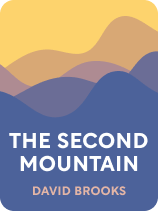

This article is an excerpt from the Shortform book guide to "The Second Mountain" by David Brooks. Shortform has the world's best summaries and analyses of books you should be reading.
Like this article? Sign up for a free trial here.
What are the two mountains that David Brooks discusses? Why does he choose one over the other?
In The Second Mountain, David Brooks talks about two approaches to life. The first approach is characteristic of individualism, which prioritizes personal liberty and spurns commitment. The second approach is characteristic of relationalism, which celebrates community and prizes commitment.
Read more to learn about these two worldviews and to understand why Brooks chooses the second mountain in his own life.
The Mountain of Individualism
The first of the two mountains is the mountain of individualism. According to Brooks, the dominant approach to life in Western culture is individualist: It emphasizes the value of the individual, divorced from community, and views self-expression as life’s primary goal. Brooks argues that despite its prominence, the individualist approach leaves us unfulfilled since it doesn’t satisfy our longing to serve others.
(Shortform note: While Western culture embraces individualism, experts observe that collectivism—the worldview that emphasizes the interconnectivity of the members of a society—is standard in many Eastern cultures. Even within Eastern countries, however, researchers observe that certain areas—such as Hokkaido, a Japanese island—still exemplify many of the characteristics of individualism.)
Brooks explains that individualism arose as a rebellion against the community-first worldview that was dominant in the wake of two world wars and the Great Depression. Though the individualist view is multifaceted, Brooks lists several assumptions essential to it:
- The ideal society secures the most freedom for its members.
- Communities that aren’t chosen voluntarily—like one’s family and country—are less important because we didn’t freely choose them.
- Worldly accomplishment is the primary gauge of success because our relationships with others aren’t as important.
- We have to decide our values for ourselves, as we shouldn’t blindly accept the values of our community.
(Shortform note: In addition to these assumptions, researchers argue that several other beliefs are essential to individualism. For instance, researchers find that individualist cultures affirm the uniqueness of every person and embrace the notion of personal responsibility for our own actions and lives.)
As these assumptions illustrate, the individualist approach claims to offer unfettered freedom—to choose our own beliefs, to focus on ourselves, and to live as we please. However, Brooks argues that the freedom that individualism prizes leads to deep dissatisfaction.
He explains that individualism’s freedom prompts young adults to take one of two paths. First, some adults dedicate themselves to worldly success—they focus on their careers, seeking prestigious jobs and promotions to find purpose. Such individuals, Brooks claims, are plagued by insecurity, as no amount of success feels like enough.
(Shortform note: In Brooks’s previous book, The Road to Character, he likewise denounced this first path, on the grounds that it emphasizes “resumé virtues” to the detriment of “eulogy virtues.” In other words, Brooks suggests, individuals on this first path neglect their moral development (which would foster the kinds of virtues we praise in eulogies) in favor of their career development (which emphasizes only the achievements on your resumé).)
When the path of success proves unfulfilling, some people turn to the second path: They pursue exhilarating experiences, such as traveling to exotic destinations, hoping these experiences will satisfy them.
(Shortform note: Danish philosopher Søren Kierkegaard famously criticized this pursuit of exhilarating experiences, which he called the aesthetic life. He argued that the aesthetic life is immoral because it’s selfish and escapist, encouraging us to forsake our responsibilities for our pleasure. However, Kierkegaard held that the aesthetic life is only the first phase of existence, as it spurs us toward ethical—and, eventually, religious—lives.)
However, Brooks asserts that neither of these paths leaves us fulfilled, as they lack a greater purpose. But, according to Brooks, this dissatisfaction is valuable since it exposes the vanity of our ego—the identity that we convey to the world. In turn, Brooks claims that we become aware of our deeper yearnings—to form deep relationships and serve others well. So, the failure of individualism points us toward relationalism, which we’ll discuss in the next section.
(Shortform note: Another source of the dissatisfaction Brooks identifies might be our fixation on happiness. Some experts argue that while we take happiness to be a self-evident good (and the pursuit of happiness to be self-evidently worthwhile), it’s not even clear what happiness is, let alone whether it’s inherently fulfilling the way we assume it is. These experts suggest that instead of trying to be happy, you should seek purpose through your habits and actions—an approach that, as we’ll see, echoes Brooks’s arguments.)
The Mountain of Relationalism
In light of individualism’s shortcomings, Brooks recommends an alternative approach: relationalism. While individualism values personal freedom and independence, relationalism values commitment and service. Consequently, Brooks argues that the relationalist approach provides meaning and fulfillment by satisfying our deep-seated desire for loving relationships.
(Shortform note: The term “relationalism” can have various meanings depending on context; for example, relationalism in physics refers to the view that space and time don’t exist independently but are rather relations of other real, material objects. Brooks uses “relationalism” much differently, however, defining it as a middle ground between individualism and collectivism.)
First, Brooks clarifies that the relationalist approach is centered around commitment. In short, he defines commitment as a promise made out of love to something or someone, without expecting something in return. Moreover, Brooks clarifies that committing to something requires shifting your behavior to serve it, even if love wavers. For instance, committing to a spouse might require tending to their needs, even if you lose your romantic affection for them.
(Shortform note: Though Brooks claims that commitment is incompatible with expecting something in return, experts argue that expectations are crucial to romantic commitment. For instance, they suggest that you should expect empathy, respect, and time from your partner; if these expectations aren’t met, dangerous power imbalances can arise. Brooks may, however, be correct that, for non-romantic commitments, we shouldn’t expect anything in return.)
Although we’ll discuss the specific nature of these commitments in the following sections, Brooks claims that at a broader level, our commitments change us in four ways:
- They mold our identity, as they become the center of our lives.
- They give us a sense of purpose, as they tether us to a larger goal.
- They give us genuine freedom, as they free us to fulfill our deepest desires.
- They help us cultivate virtue, as they teach us to become self-sacrificial rather than self-centered.
So, individuals that abandon the individualist approach in favor of its relationalist counterpart find themselves transformed by their commitments—they cast off their egos, and embrace a lifestyle that’s other-centered rather than self-centered.
(Shortform note: Additionally, researchers found that commitments can also alter our behavior—especially when these commitments are specific. In an experiment performed at a California hotel, these researchers tested two groups of guests, one that committed generally to saving energy and one that committed specifically to hanging their towels for reuse. While guests who made the specific commitment were most likely to hang their towels and turn off their lights, guests who made the general commitment were only slightly more likely to do so than those who made no commitment.)

———End of Preview———
Like what you just read? Read the rest of the world's best book summary and analysis of David Brooks's "The Second Mountain" at Shortform.
Here's what you'll find in our full The Second Mountain summary:
- The negative consequences of the West's focus on individualism
- Why you should embrace relationalism to lead a fulfilling life
- The four commitments that constitute relationalist living






